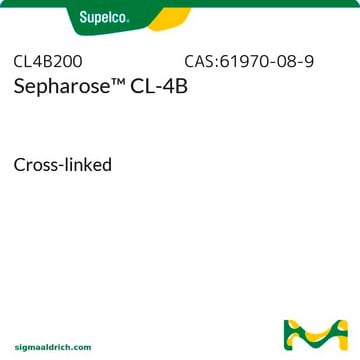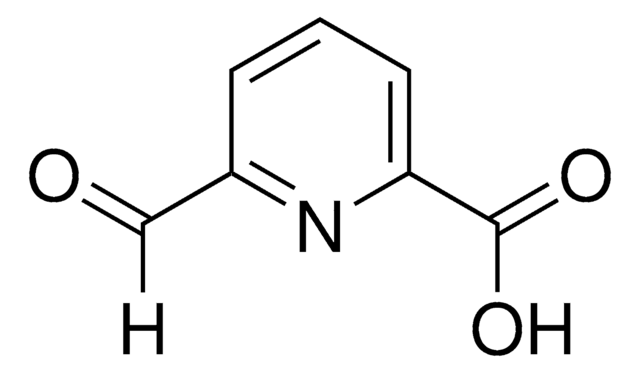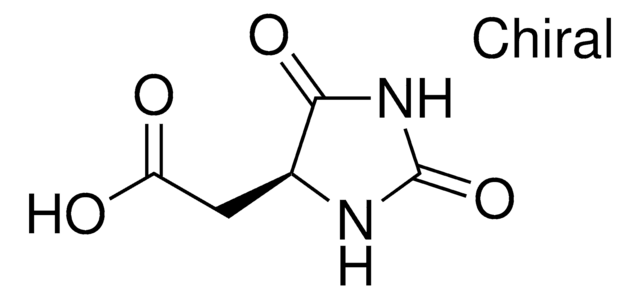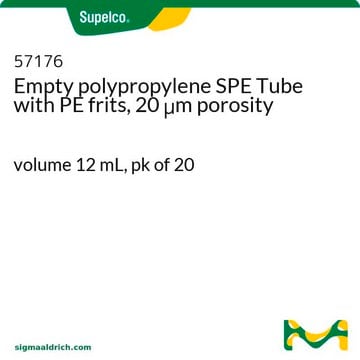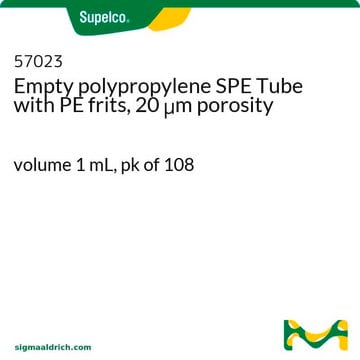CL2B300
Sepharose™ CL-2B Size Exclusion Resin
Cross-linked, 70-230 mesh
Sign Into View Organizational & Contract Pricing
All Photos(1)
About This Item
Recommended Products
Product Name
Sepharose™ CL-2B, Cross-linked
Quality Level
form
suspension
bead diameter
60-200 μm
pore size
100,000-20,000,000 fractionation range (Dextrans)
70,000-40,000,000 fractionation range (Globular proteins)
storage temp.
2-8°C
Looking for similar products? Visit Product Comparison Guide
Related Categories
General description
CL2B300-1L′s updated product number is GE17-0140-01
Application
Sepharose CL-2B is used in affinity chromatography, gel filtration chromatography, protein chromatography, separation media and resins. Sepharose CL-2B has been used to study ovarian carcinoma and cystic fibrosis.
Sepharose™ CL-2B has been used as resins in:
- gel permeation chromatography (GPC)
- gravity chromatography
- streptavidin affinity chromatography
- size exclusion chromatography
Legal Information
Sepharose is a trademark of Cytiva
replaced by
Product No.
Description
Pricing
Signal Word
Warning
Hazard Statements
Precautionary Statements
Hazard Classifications
Flam. Liq. 3
Storage Class Code
3 - Flammable liquids
WGK
WGK 1
Flash Point(F)
102.2 °F - closed cup
Flash Point(C)
39 °C - closed cup
Choose from one of the most recent versions:
Already Own This Product?
Find documentation for the products that you have recently purchased in the Document Library.
Customers Also Viewed
H J Grimek et al.
Biology of reproduction, 30(2), 397-409 (1984-03-01)
Acetone precipitates of bovine follicular fluid from small (3-5 mm) and large (10-20 mm) follicles were fractionated by nondissociative procedures involving chromatography on Sephacryl S-300, DEAE cellulose, and Sepharose CL-2B. Most of the proteoglycan material eluted with a relatively low
Mouse liver mitochondria isolation, size fractionation, and real-time MOMP measurement
Renault TT, et al.
Bio-protocol, 6(15) (2016)
Cell wall-degrading enzymes and pectin solubility and depolymerization in immature and ripe watermelon (<I>Citrullus lanatus</I>) fruit in response to exogenous ethylene.
Karakurt, Y., and Huber, D.J.
Physiologia Plantarum, 116(3), 398-405 (2002)
Development of a quantitative assay for the characterization of human collectin-11 (CL-11, CL-K1)
Bayarri-Olmos R, et al.
Frontiers in immunology, 9, 2238-2238 (2018)
K R Foltz et al.
The Journal of cell biology, 111(6 Pt 2), 2951-2959 (1990-12-01)
Fertilization in the sea urchin involves species-specific interaction between the ligand bindin on the surface of acrosome-reacted sperm and a receptor of high molecular weight on the surface of the egg. Efforts to understand this interaction and the resultant signal
Our team of scientists has experience in all areas of research including Life Science, Material Science, Chemical Synthesis, Chromatography, Analytical and many others.
Contact Technical Service
